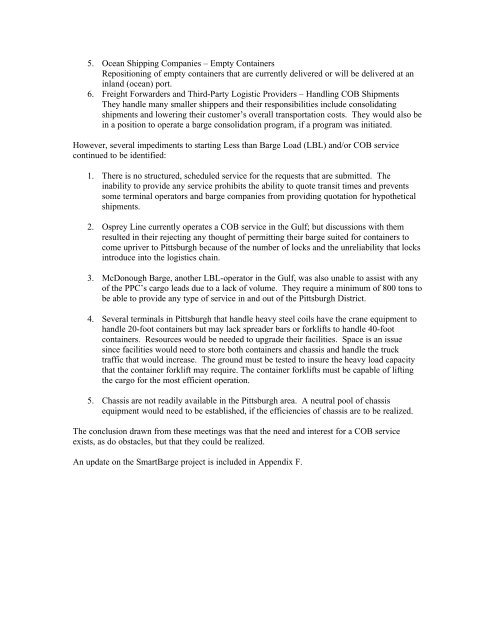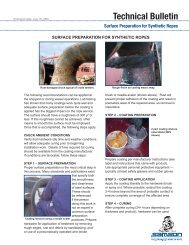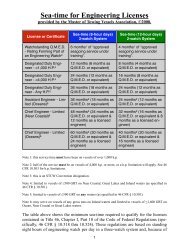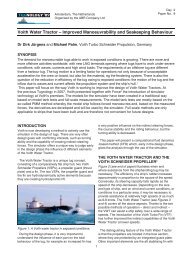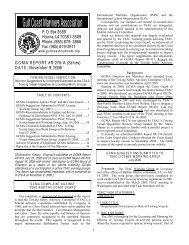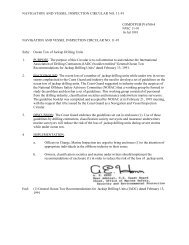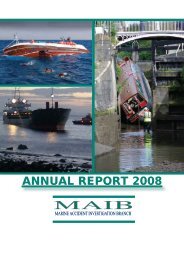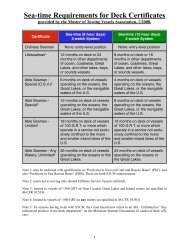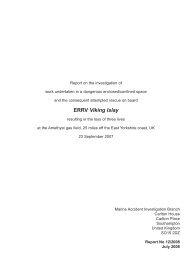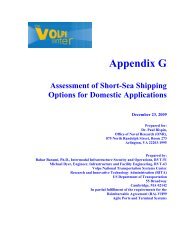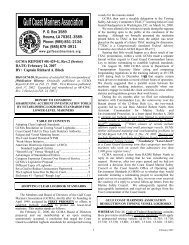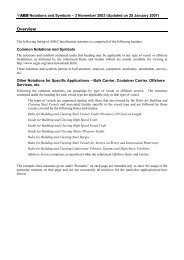Container-on-Barge Pre-Feasibility Study Final Report - Towmasters ...
Container-on-Barge Pre-Feasibility Study Final Report - Towmasters ...
Container-on-Barge Pre-Feasibility Study Final Report - Towmasters ...
Create successful ePaper yourself
Turn your PDF publications into a flip-book with our unique Google optimized e-Paper software.
5. Ocean Shipping Companies – Empty <str<strong>on</strong>g>C<strong>on</strong>tainer</str<strong>on</strong>g>s<br />
Repositi<strong>on</strong>ing of empty c<strong>on</strong>tainers that are currently delivered or will be delivered at an<br />
inland (ocean) port.<br />
6. Freight Forwarders and Third-Party Logistic Providers – Handling COB Shipments<br />
They handle many smaller shippers and their resp<strong>on</strong>sibilities include c<strong>on</strong>solidating<br />
shipments and lowering their customer’s overall transportati<strong>on</strong> costs. They would also be<br />
in a positi<strong>on</strong> to operate a barge c<strong>on</strong>solidati<strong>on</strong> program, if a program was initiated.<br />
However, several impediments to starting Less than <strong>Barge</strong> Load (LBL) and/or COB service<br />
c<strong>on</strong>tinued to be identified:<br />
1. There is no structured, scheduled service for the requests that are submitted. The<br />
inability to provide any service prohibits the ability to quote transit times and prevents<br />
some terminal operators and barge companies from providing quotati<strong>on</strong> for hypothetical<br />
shipments.<br />
2. Osprey Line currently operates a COB service in the Gulf; but discussi<strong>on</strong>s with them<br />
resulted in their rejecting any thought of permitting their barge suited for c<strong>on</strong>tainers to<br />
come upriver to Pittsburgh because of the number of locks and the unreliability that locks<br />
introduce into the logistics chain.<br />
3. McD<strong>on</strong>ough <strong>Barge</strong>, another LBL-operator in the Gulf, was also unable to assist with any<br />
of the PPC’s cargo leads due to a lack of volume. They require a minimum of 800 t<strong>on</strong>s to<br />
be able to provide any type of service in and out of the Pittsburgh District.<br />
4. Several terminals in Pittsburgh that handle heavy steel coils have the crane equipment to<br />
handle 20-foot c<strong>on</strong>tainers but may lack spreader bars or forklifts to handle 40-foot<br />
c<strong>on</strong>tainers. Resources would be needed to upgrade their facilities. Space is an issue<br />
since facilities would need to store both c<strong>on</strong>tainers and chassis and handle the truck<br />
traffic that would increase. The ground must be tested to insure the heavy load capacity<br />
that the c<strong>on</strong>tainer forklift may require. The c<strong>on</strong>tainer forklifts must be capable of lifting<br />
the cargo for the most efficient operati<strong>on</strong>.<br />
5. Chassis are not readily available in the Pittsburgh area. A neutral pool of chassis<br />
equipment would need to be established, if the efficiencies of chassis are to be realized.<br />
The c<strong>on</strong>clusi<strong>on</strong> drawn from these meetings was that the need and interest for a COB service<br />
exists, as do obstacles, but that they could be realized.<br />
An update <strong>on</strong> the Smart<strong>Barge</strong> project is included in Appendix F.


